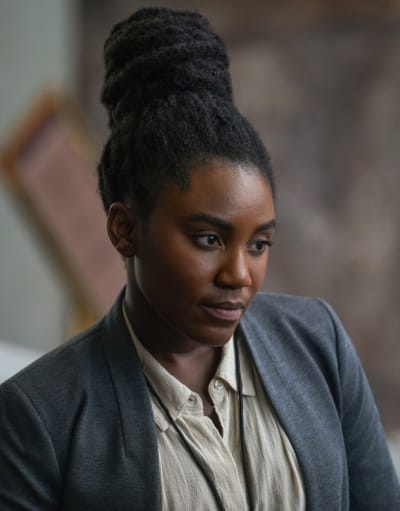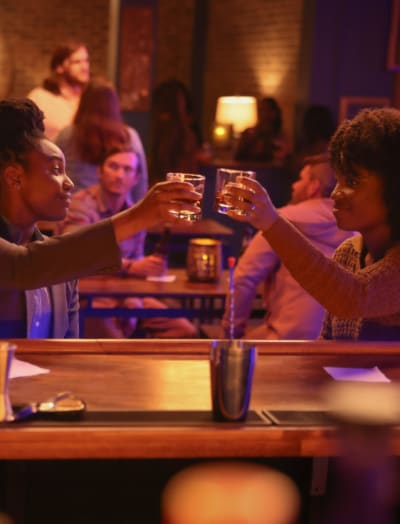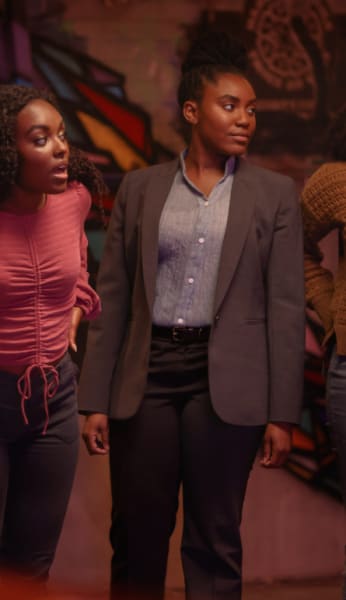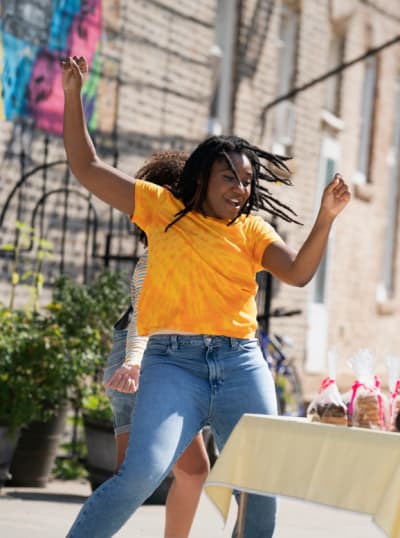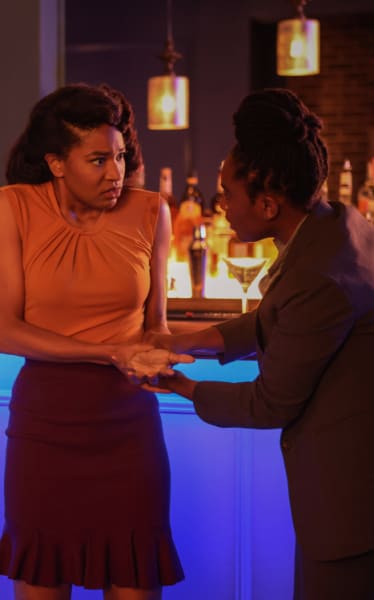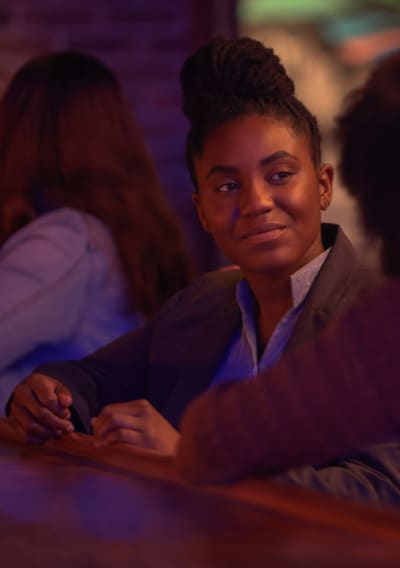Ireon Roach has been performing since she was a child and now tackles her first role as a regular in a major television series — parole officer Keisha in The CW’s reboot of the sci-fi series 4400.
We caught up with Ireon to get insight into her character and what’s in store for the 4400.
Check out our interview below!
Mary Littlejohn: I’ve loved 4400 so far. What drew you to the show, and how did you become involved?
Ireon Roach: The cast all make fun of me because I never called myself the biggest fan of science fiction. But upon receiving this audition request, reading more about it, diving into the original 4400, and seeing how they were thinking about reworking that story, I got very excited.
I was excited to have black people exist in sci-fi, without it being a lesson, without it being painful for them, and to have joy — to just exist! I think that was something that got pulled from the original — everyone in the original just got to exist.
Everyone in this reboot just gets to exist, and the craziest thing that is happening is not our skin color, but people falling from the sky out of green light! That was so exciting and just very bizarre, and I just wanted to know where that could possibly go.
So the way I got involved was I sent my tapes, there was a little bit of back and forth, a “will they/won’t they,” and we did! I’m so happy that it happened!
It’s so great to see such an amazingly inclusive cast in sci-fi. It’s one of the show’s strengths, how unapologetically inclusive it is. It almost feels revolutionary! What does it mean to you to be part of that?
It means a lot, especially as a young artist. This is my first time venturing into being a regular on a series. It means a lot that I can feel comfortable as myself on set, working, speaking to producers, talking with the rest of the cast — which is at every level very inclusive and diverse.
It also means a lot that it is immortalized because it’s on television, and it gets to spark that conversation, especially with it being a reboot. The conversation isn’t standalone — it happens in tandem with the original and how that was perceived and rolled out.
So it feels like a very solid foundation and springboard. It also closely aligns with how I live my life and the art that I want to see. This is something that I would want to see.
Absolutely, it’s wonderful. Did you watch the original series as soon as you got the part, or when you were auditioning?
I watched the original as I was auditioning, just to get a feel of the tone, of where we were coming from, where we could go. And then I just couldn’t stop!
Any memorable or fun behind-the-scenes stories that you can share?
Yeah! This one is kinda silly, but it’s on my mind quite a lot. [laughs] There’s a scene between Jharrel and I — Joseph David-Jones. It was really late at night when we were filming it, but it was supposed to be morning.
We were out having breakfast, and props got us real pancakes and bacon and things like that, and it was late, but we were so hungry! You just want to eat on set — there’s nothing else going on.
[Joseph David-Jones] said, “Hey, can we get these warmed up?” and the scene became about the pancakes. We were just actually having breakfast at midnight, and it was really fun. I think it also lined up with where we were at that point in the story of what the friendship is between these people.
I remember distinctly just having a blast with those pancakes and just letting that joy seep into myself and also Keisha in that moment. It was really funny, really silly.
I love the dynamic between Keisha and Jharrel. It’s so much fun to watch how they’ve already grown from the beginning to now that they seem like they’re becoming pretty good friends.
In the most recent episode (4400 Season 1 Episode 4), it felt like Keisha had an epiphany and realized that maybe time travel is real and the 4400 are telling the truth. She’s such a practical person, so going forward, how does she reconcile that with her previous understanding of the world?
I think Keisha is going to have to re-learn a lot. Episode 5 [airing Monday, November 22] will actually flashback to a lot of moments in Keisha’s life where she is not the person she is right now.
She had much more life and joy and laughter with her sister and her family, and we just get to see this lighter version in stark contrast to this shell that she is now, this stoic, by-the-book person.
It’s because she is getting those inklings of doubt in how she does her job and how she works within the system, and how the system is working for these people. First and foremost, she wants to help.
She wants to protect, and she understands, because of her work as a parole officer, that does not always mean that you trust everything that you hear.
It means trusting what you see and what you feel, and I think she has a lot to learn from the 4400, as we start to see in Episode 4.
“What happens if I listen? What happens if I take you at face value?” That just becomes incredibly difficult as she juggles this case with her personal life, even though they’re dealing with the same things, the same questions, and answers, and getting her caught up in the middle.
What can you tease for Episode 5? What should we be looking forward to this upcoming episode and in the rest of the season?
Just getting to see Keisha in a happier time, and also the story of her sister’s death. It comes to be not only a thing of the past but something that starts to move again when the person that’s responsible for her sister’s death reaches out to the family.
We see what this does to Keisha in her personal life and then with work. The 4400 are granted provisional release, coming out of those smaller trips that we got to take before.
It’s about how we will find housing and things for them, Jharrel and I. How will we make sure they’re reintegrated into society?
In that, Keisha gets even further conflicted, especially as she’s battling with the feelings and thoughts and actions she has to take — with her sister’s death and making sure that the public is safe.
So she’s struggling, [considering] the safety of the people, the 4400, and the people that’ll be around them.
When did you get started? How did you know you wanted to be a performer? What led you to this vocation?
I have been entertaining my family my whole life. My sister and I used to memorize scenes from Hannah Montana and re-do them in the living room. I remember that very specifically.
The way I stepped into performing and the dramatic arts: I grew up on the Southside of Chicago. I love Chicago, and there is a really robust youth poetry scene there.
I was very involved in it from a very young age. I always loved writing and poems — not only the rhymey-Dr. Seussy poems. Luckily, my father introduced me at a very young age to Def Jam poetry, and I was like, “Wait, are they rapping? Are they singing? Is it poetry?” and it was all of those things. I got obsessed with the cool performance of it, the play of language.
So, I started playing with language. I started playing with poetry and spoken word. That led me into a drama club when poetry season was over, which led me, step by step by step [to where I am now].
It’s always great to hear about how people get started and what has led them to where they are now.
Thank you so much for chatting! I’m really looking forward to the rest of the series. It’s been great to watch so far!
Thanks, it was wonderful speaking with you!
4400 airs weekly on The CW, Monday nights at 9/8c.
Some portions of this interview have been edited for clarity.
Mary Littlejohn is a staff writer for TV Fanatic. Follow her on Twitter.


